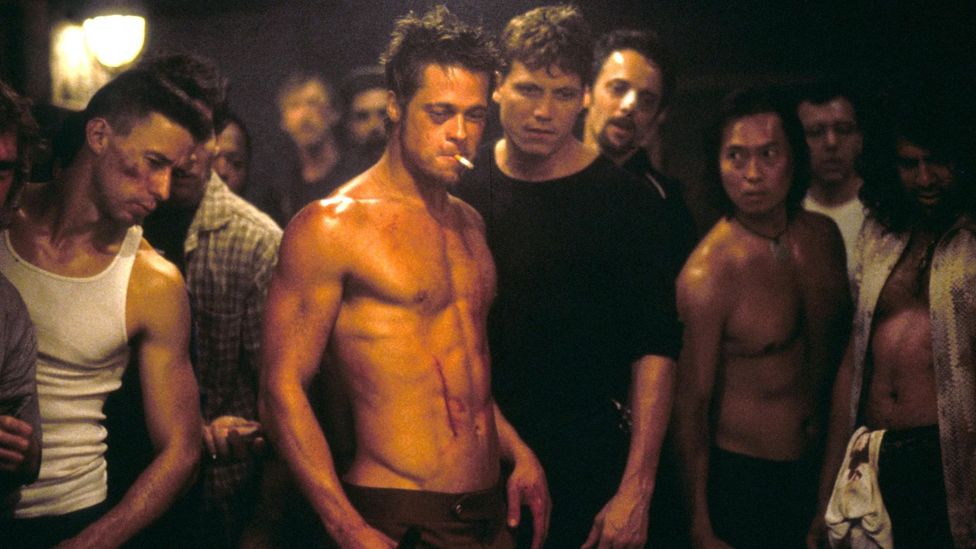Fight Club
"Fight Club," directed by David Fincher and released in 1999, is a thought-provoking and darkly satirical film that delves into the complexities of modern masculinity, consumerism, and societal discontent. Based on Chuck Palahniuk's novel of the same name, the movie stars Edward Norton as an insomniac and disillusioned white-collar worker known only as the Narrator, and Brad Pitt as Tyler Durden, a charismatic and anarchic soap salesman.
The film's unnamed Narrator leads a mundane and unfulfilling life, working as a recall coordinator for an automobile company. Suffering from chronic insomnia and an increasing sense of disillusionment, the Narrator finds himself increasingly detached from society. Seeking solace, he attends various support groups for illnesses he does not have, finding comfort in the emotions expressed by the genuine sufferers.
On one of his business trips, the Narrator meets Tyler Durden, a fellow traveler with a polarizing outlook on life. Tyler lives in a dilapidated house, which soon becomes the site of Fight Club, an underground fighting ring where men gather to unleash their pent-up aggression and reclaim their masculinity. The club becomes a cathartic outlet for those disillusioned with their unfulfilling lives, transforming them into a brotherhood bonded by violence.
As Fight Club gains popularity, Tyler's philosophies on rejecting materialism, conformity, and societal expectations gain traction among its members. The club evolves into Project Mayhem, a clandestine organization seeking to dismantle consumer culture and societal norms. The members, under Tyler's charismatic leadership, engage in a series of increasingly dangerous and destructive acts to destabilize the establishment.
However, as the Narrator becomes increasingly involved with Project Mayhem, he also becomes aware of the darker aspects of Tyler's personality. A twist in the narrative reveals that Tyler is, in fact, a manifestation of the Narrator's subconscious—a split personality driven by his discontent and desire for liberation.
The revelation sends the film into a psychological and existential journey as the Narrator grapples with the consequences of his actions and the destructive nature of his alter ego. The line between reality and delusion blurs, leaving both the Narrator and the audience questioning the true nature of the events unfolding on screen.
Fincher's direction in "Fight Club" is marked by its visceral and gritty visuals, capturing the raw energy of the fight scenes and the characters' descent into chaos. The film's innovative cinematography and editing techniques add to the surreal and disorienting atmosphere, reflecting the fractured psyche of the Narrator.
At its core, "Fight Club" is a scathing critique of consumer culture and the alienation experienced by many in modern society. The film explores the sense of powerlessness and emasculation felt by contemporary men and questions the pursuit of material wealth as a means of fulfillment.
Edward Norton's performance as the Narrator showcases his versatility as an actor, portraying both vulnerability and intensity. Brad Pitt's portrayal of Tyler Durden exudes charisma and charm, making him a captivating yet enigmatic figure throughout the film.
"Fight Club" was met with a mix of critical reactions upon its release, with some praising its boldness and social commentary while others criticized its violence and subversive themes. Despite initial divisive reviews, the film has since gained a cult following and is widely regarded as a significant work in contemporary cinema.
Over the years, "Fight Club" has become a cultural touchstone, inspiring numerous discussions, academic analyses, and debates surrounding its themes and messages. Its impact on popular culture is evident through its memorable quotes and iconic imagery, including Tyler's now-famous quote: "The first rule of Fight Club is: You do not talk about Fight Club."
In conclusion, "Fight Club" is a provocative and thought-provoking film that challenges societal norms and explores the complexities of masculinity and discontent in the modern world. David Fincher's masterful direction, combined with Edward Norton and Brad Pitt's compelling performances, makes the movie a compelling exploration of identity, consumerism, and the search for meaning in a society increasingly detached from genuine human connections. "Fight Club" remains a powerful and influential work that continues to captivate audiences and provoke meaningful conversations about the human condition and the quest for self-discovery.

Comments
Post a Comment